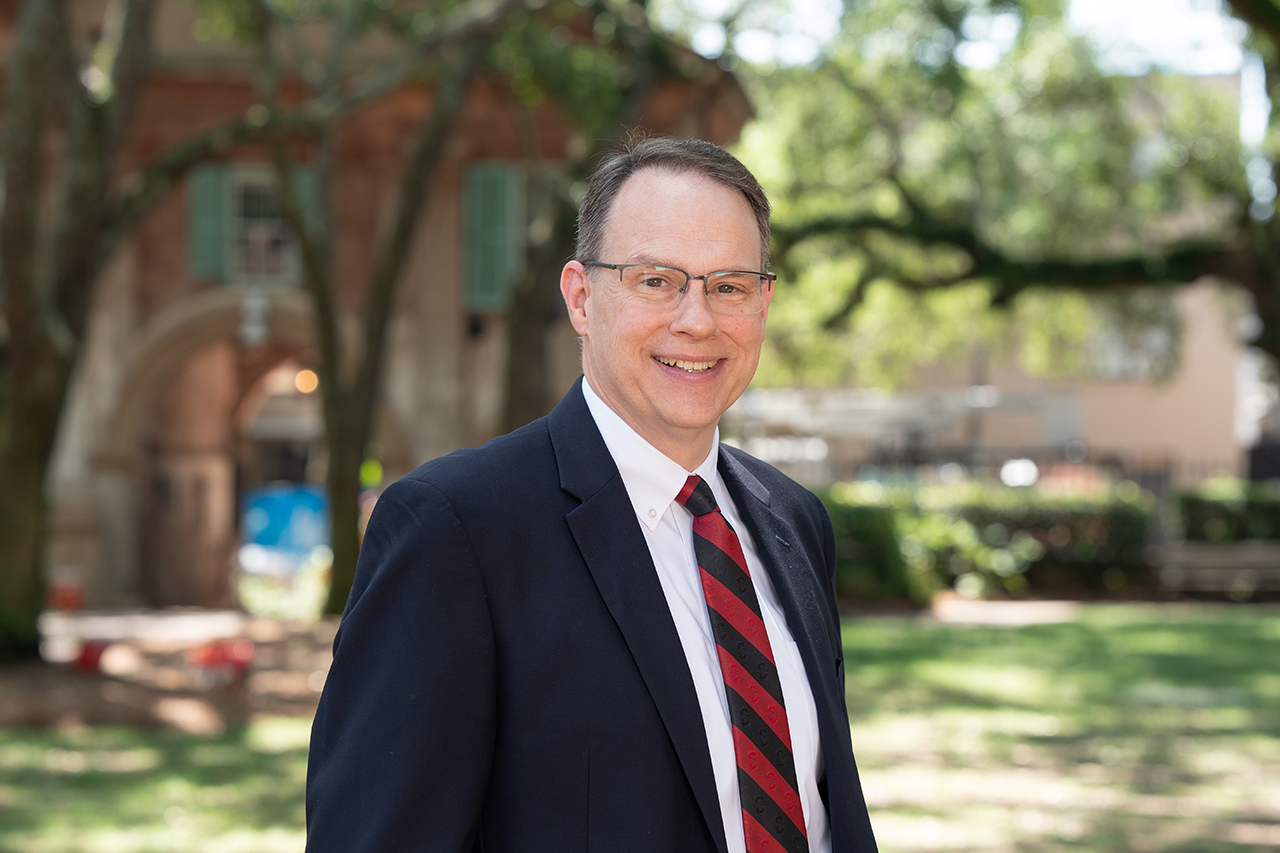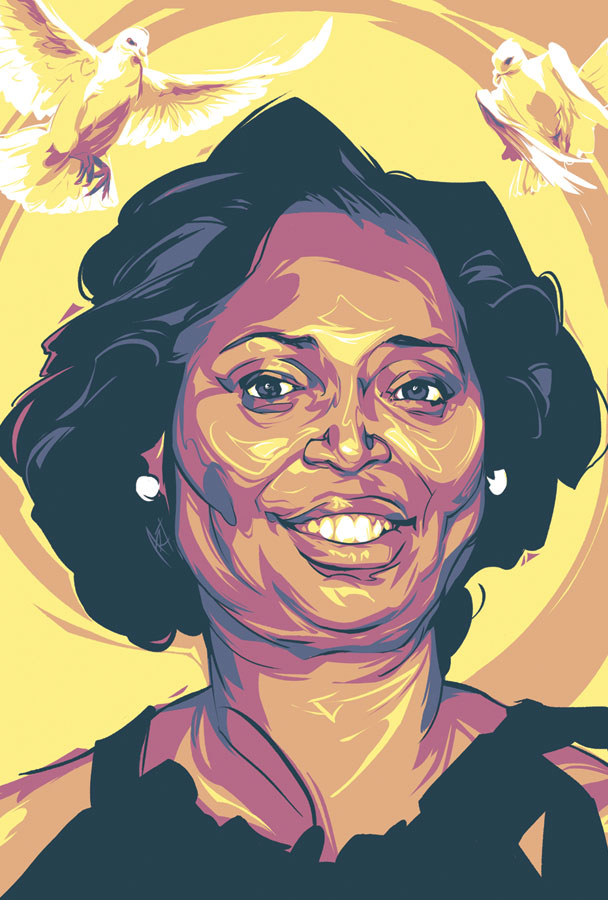Professor's Passion Is All Through Grace
Psychology professor Cindi May has a doctorate in cognitive psychology, but it wasn’t until her late daughter Grace was born that she understood what families with neuro-atypical children go through, which is just the beginning of this powerful – and empowering – story.

By Stephanie Hunt
Sam Cusick Hazeltine doesn’t miss a basketball game. You’ll find him behind the Cougars’ bench, handing towels to sweaty players, hustling up water bottles and enthusiastically high-fiving anyone with a free hand. The 33-year-old sports fanatic has been a fixture on the sidelines since Coach Earl Grant hired him as a team manager when Sam was a CofC sophomore. “Now Coach Kelsey has gotten on the Sam train,” says his mother, Cate Cusick. “The team loves him! If only that meant he could get us tickets!”
Joking aside, Sam’s mom knows that her son, who has Down syndrome, already got the ticket. The ticket to go to high school along with developmentally typical kids. The ticket to go to college, to study, meet peers, figure out how to do laundry (or not) and live independently, like other young adults. “Sam thrived at the College of Charleston for four years,” says Cusick. “He had wonderful professors, made lifelong friends, had paid internships – the whole shooting match. And that’s 100% thanks to Cindi May. What Cindi put in motion has been life changing and life enhancing for our family, and for so many others.”
The “whole shooting match” that Cusick refers to is the College’s REACH Program, a four-year, fully inclusive certificate program for students with intellectual or cognitive disabilities, that May envisioned and helped develop. As a psychology professor whose doctoral work at Duke University focused on human memory, cognition, circadian rhythms, and improving cognitive outcomes for those who are aging and neurotypical individuals, May was well aware of the fact that people learn differently. But it wasn’t until her daughter Grace was born with Down syndrome that May began to understand the immense hurdles confronting families with neuro-atypical children – and the lack of educational opportunity and support for kids like Grace, kids like Sam.
“I’m embarrassed and humbled that it took having a child myself to recognize the need; it simply wasn’t on my radar,” says May, who had been plenty busy juggling the life of an academic with being mom to Tom and Sarah, her 3-year-old twins, when in 2003, she gave birth to triplets – Grace, Lily and Sam. At the time, advocacy was not only not on her radar; it wasn’t anywhere near being feasible. “I’m working full time, continuing to publish and teach, with twins and triplets at home, so really just getting through the day, keeping up with the laundry and diapers and not losing someone was all I could do,” she laughs.
Grace was the most robust of the triplets at birth and a happy and easy baby and toddler. By age 2, she was already starting to read – but even so, May and her husband, Steve Feingold, an emergency room physician, hit roadblocks when they tried to enroll Grace in the same preschool her older siblings attended. Having been through the drill before, May knew the admission process typically entails a short observation, “like 15 minutes,” she says. This time, “they had a team watch Grace, taking notes on a clipboard, for three hours, after which they told me she could come only for half a day, with an assistant that we would pay for, and only until she jeopardized the academic integrity of the classroom. This for a 2-year-old – who could read!” Instead, they enrolled Grace at the College’s N.E. Miles Early Childhood Development Center.
That experience catapulted May into exploring the local opportunities, or lack thereof, for kids with intellectual and developmental disabilities, and researching best practices for inclusion. Spurred by Robin Smith, whose son had Down syndrome and whom May dubs a “benevolent tornado,” May, along with Smith, began conversations with public and parochial schools. They brought in national experts and hosted a conference at the College. The South Carolina Catholic school superintendent was on board: “I don’t know how to do this, but we need to explore it,” she told May, who was pleased to be gaining some momentum toward inclusion. Then everything changed.
Be the Silver Lining
The summer after Grace’s first year in preschool, May noticed her daughter had some small bruises but didn’t think much of it. Not long afterward, she spotted another bruise on Grace’s earlobe and casually mentioned it to their pediatrician. He sent them immediately to the Medical University of South Carolina. After six weeks in the pediatric intensive care unit receiving treatment for leukemia, Grace, age 3, died.
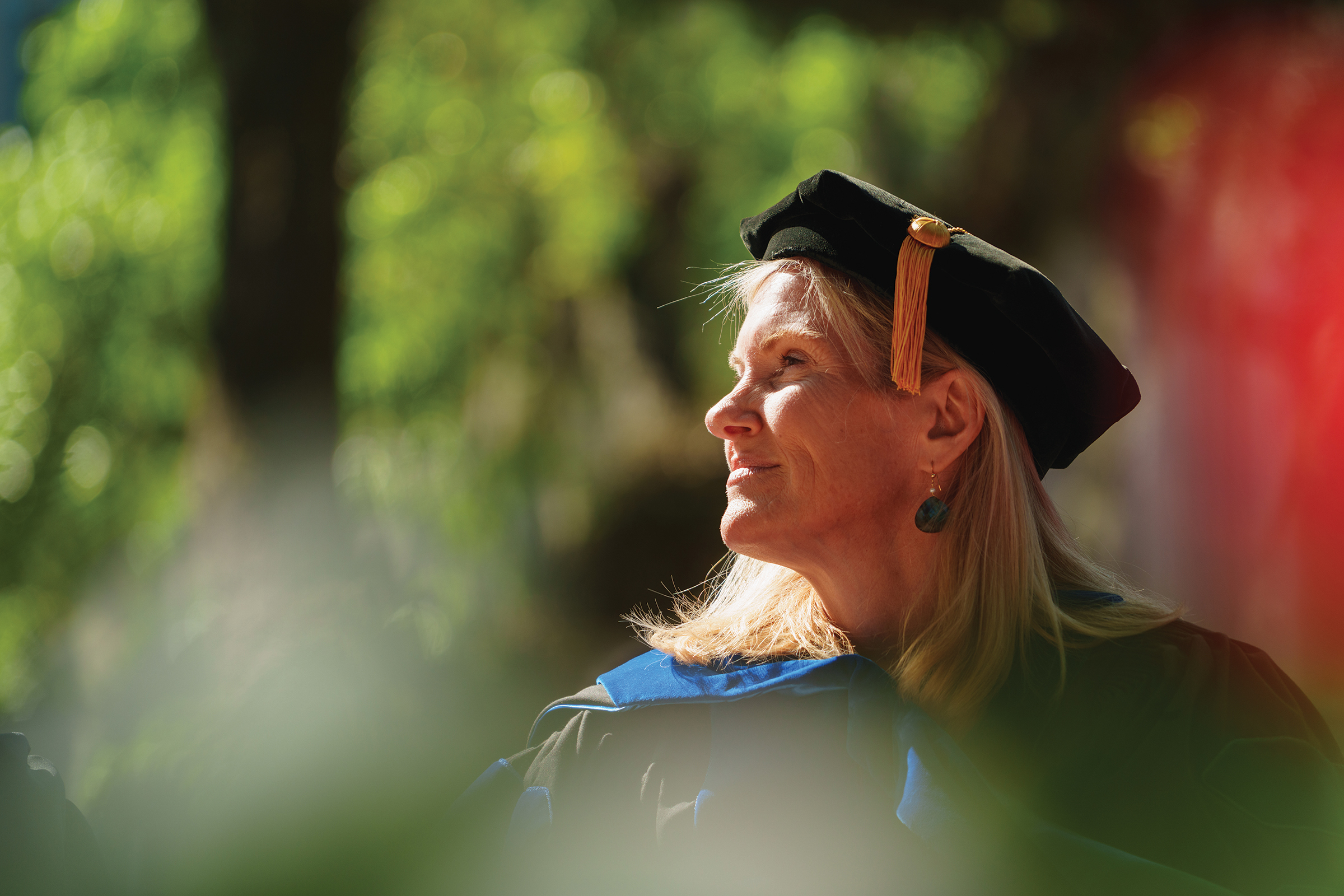
Fast forward to the Cistern last spring, where, on a gorgeous, sunny Mother’s Day weekend, May delivered the 2023 commencement address. “When life hands you more than you asked for, dig in,” she told the new graduates and their families. “Uncertainty in life can be difficult, but when you embrace the unexpected, life can be extraordinary. Be the silver lining when life deals you a hard blow.”
For the May and Feingold family, the loss of their beautiful daughter was more than a hard blow. It was devastating. “I was so bitter and angry,” says May, a devoted Catholic. But in her grief, May realized she had something to offer, and that, in fact, her skills as a researcher and educator might help move the needle in teaching others about the value of inclusion and the need to create more opportunities for the Graces of the world. “I can pull myself together and continue this cause,” she told herself. A week or so later, she got a call from Bishop England High School asking for assistance: Three students with intellectual disabilities were interested in enrolling. Could she help?
Through May’s community advocacy, including spearheading the team that initiated Bishop England’s Options Program, a groundbreaking program that integrates neurodiverse students into the regular high school experience along with dedicated peer and faculty support, she became friends with her CofC colleague Alison Piepmeier, who was the director of the Women’s and Gender Studies Program and whose daughter Maybelle has Down syndrome. The two moms strategized and collaborated on various disability advocacy issues, but then Piepmeier was diagnosed with terminal brain cancer. After her death in 2016, May and Feingold and their four children welcomed 7-year-old Maybelle into their family.
Twins, followed by triplets, followed by a shattering loss, followed by two busy full-time professionals and their four children embracing a child with a disability – it’s not your standard family dynamic. But there’s nothing standard about how May, a woman of faith and fortitude, sees the world. She spoke from lived experience, not platitudes, when she assured the Class of 2023 that “when you embrace the unexpected, life can be extraordinary.”
Reaching Higher
After months of work, travel to observe other programs and consultation with experts in the field, May helped Bishop England launch its Options Program in 2007. “We started with three students,” says May. When Maybelle started high school there in late summer 2023, she was one of 18 neurodiverse kids in the program. “From Day 1, Maybelle felt she belonged like everyone else. She went to swim practice and was invited out for coffee by another team member. The BE students have been tremendous – Maybelle’s been invited out for dinner and a movie with kids. She does volunteer work, competes on the high school swim team. It is astonishing how deeply woven into the fabric that program is.”
In addition to faculty specially trained in adaptive learning, the school offers a class called Options Scholars, where typical students learn about disability history, policy and legislation and work one on one supporting a student with intellectual disabilities. On the social side, a Band of Buddies club makes sure Options students are included in extracurricular activities. “They don’t just go to football games; they’re included in tailgates pre-game,” says May. “They grab bagels before school. Maybelle and her Options classmates are doing all the activities you’d do as a high schooler.”

Donald Bailey of Mount Pleasant, a former member of the alumni board of the University of South Carolina and the father of an autistic son, knew of May’s work at Bishop England. Around the same time the Options Program was getting underway, Bailey was seeking college options for his son and initially approached the College with an idea to create a non-degree program for neurodiverse students like his son. “It was right here nearby, and would have been ideal for our family,” says Bailey, but in 2007, his proposal got no traction. Bailey, whom May calls “another benevolent tornado,” instead turned to USC, where he orchestrated the LIFE Program, an inclusive post-secondary program for neurodiverse students and now one of the nation’s premier models, replicated at Winthrop, Clemson and Coastal Carolina universities.
In light of the success of the LIFE programs, Bailey approached May: “I sure would like to see this at the College of Charleston,” he said, requesting her help. Bailey won the support of then-President George Benson and School of Education Dean Fran Welch – and with May tackling the groundwork, the team began gathering stakeholders and dreaming of what a program might look like. May secured an initial $150,000 grant from College Transition Connection to get the ball rolling. “I spent 2009 fleshing out plans for curriculum and housing and doing some PR to educate colleagues,” she says, noting that she met pushback. Housing, for example, was already tight on campus: “We don’t have room for our own students, let alone them,” she’d hear, rankling at the “othering.” Countered May: “But these are our students. We are all one and the same.
“We’re not trying to camouflage their disability and have them earn a B.A. or B.S. We’re not taking a person in a wheelchair and making them run a marathon. We’re trying to help them go as far as they can in a wheelchair,” she argued, making the case that “every young adult deserves a transitional period where they increase their education, increase their job readiness, engage in internships and learn how to budget their time.”
In 2010, May secured an additional $2.5 million federal grant to ensure the program’s sustainability – and now in its 13th year, the College’s REACH Program is ensconced on campus. At the School of Business, for example, an annual program teaches students the inclusive principles of universal design – design that takes into account accessibility by all people, regardless of age or disability, and students then develop and pitch a new product as part of a Shark Tank–like competition.
Instead of pushback, faculty now celebrate the value of inclusiveness. They appreciate REACH because it increases diversity in their classes and offers a different perspective.
Indeed, the appreciation and celebration of the program continues to reach far and wide – look no farther than the basketball bench. When Sam Hazeltine, who also went through the Bishop England Options Program, graduated from REACH in May 2015, the South Carolina House of Representatives declared May 15 Sam Francis Cusick Hazeltine Day across the state.
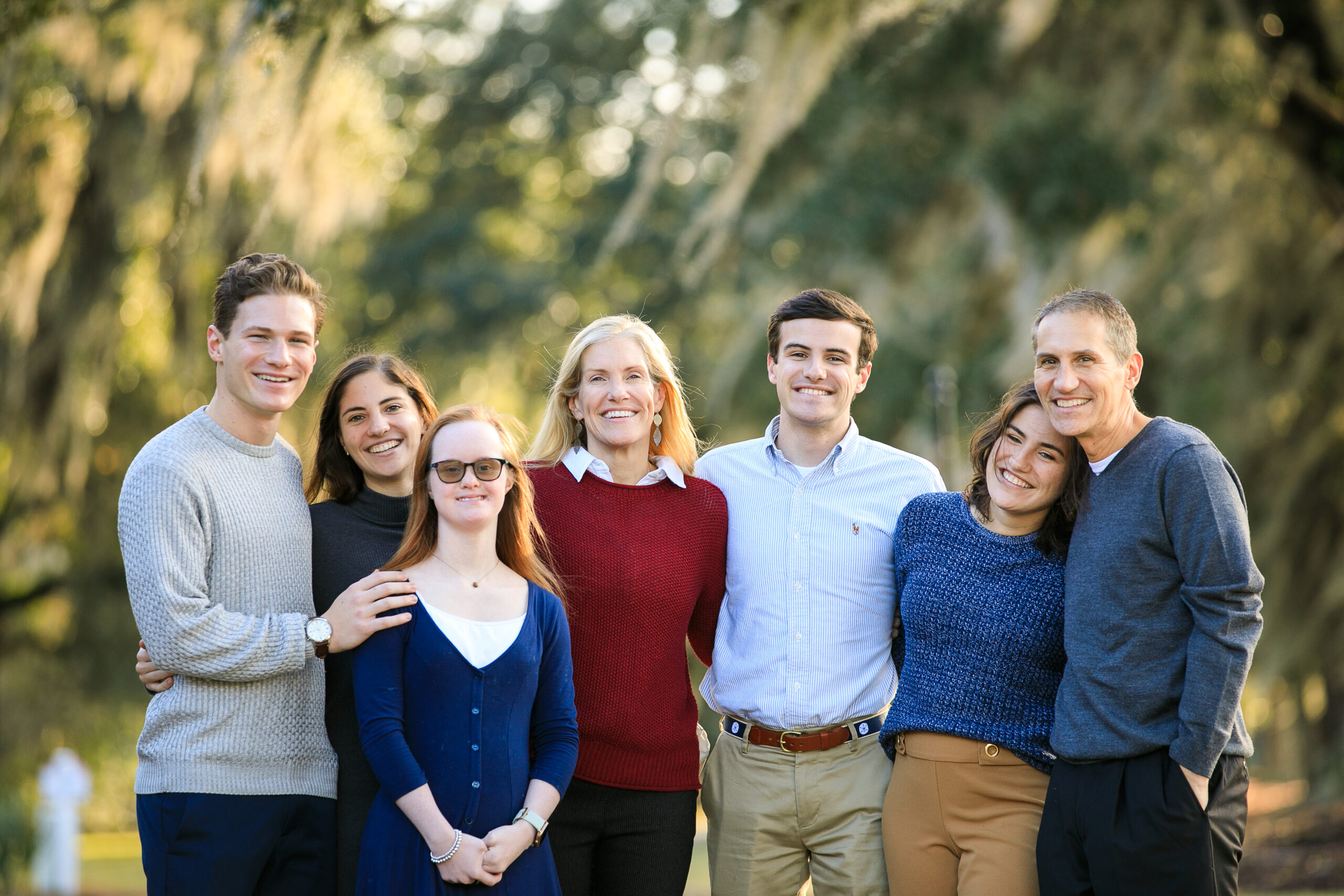
A Gateway
May’s experience as a parent to Grace and Maybelle continues to shape her academic focus, including current research exploring how receiving a diagnosis like Down syndrome can become a “flashbulb memory” – i.e., a significant and often traumatic event like 9/11. May is looking at how that initial diagnosis experience might impact future outcomes. She’s also researching autobiographical memory in children with Down syndrome, among other studies. And, when not attending swim meets or taking Maybelle to sleepovers or keeping track of her older children – Tom now in law school, Sarah a clinical research coordinator in Greenville, S.C., and Lily and Sam both in college – May continues to try “making the world a slightly friendlier place” for people with disabilities, she says. Her latest initiative: the Hidden Disabilities Sunflower Program, which May, a Furman University graduate, helped bring to the Lowcountry as part of her participation in her alma mater’s Diversity Leadership Initiative.
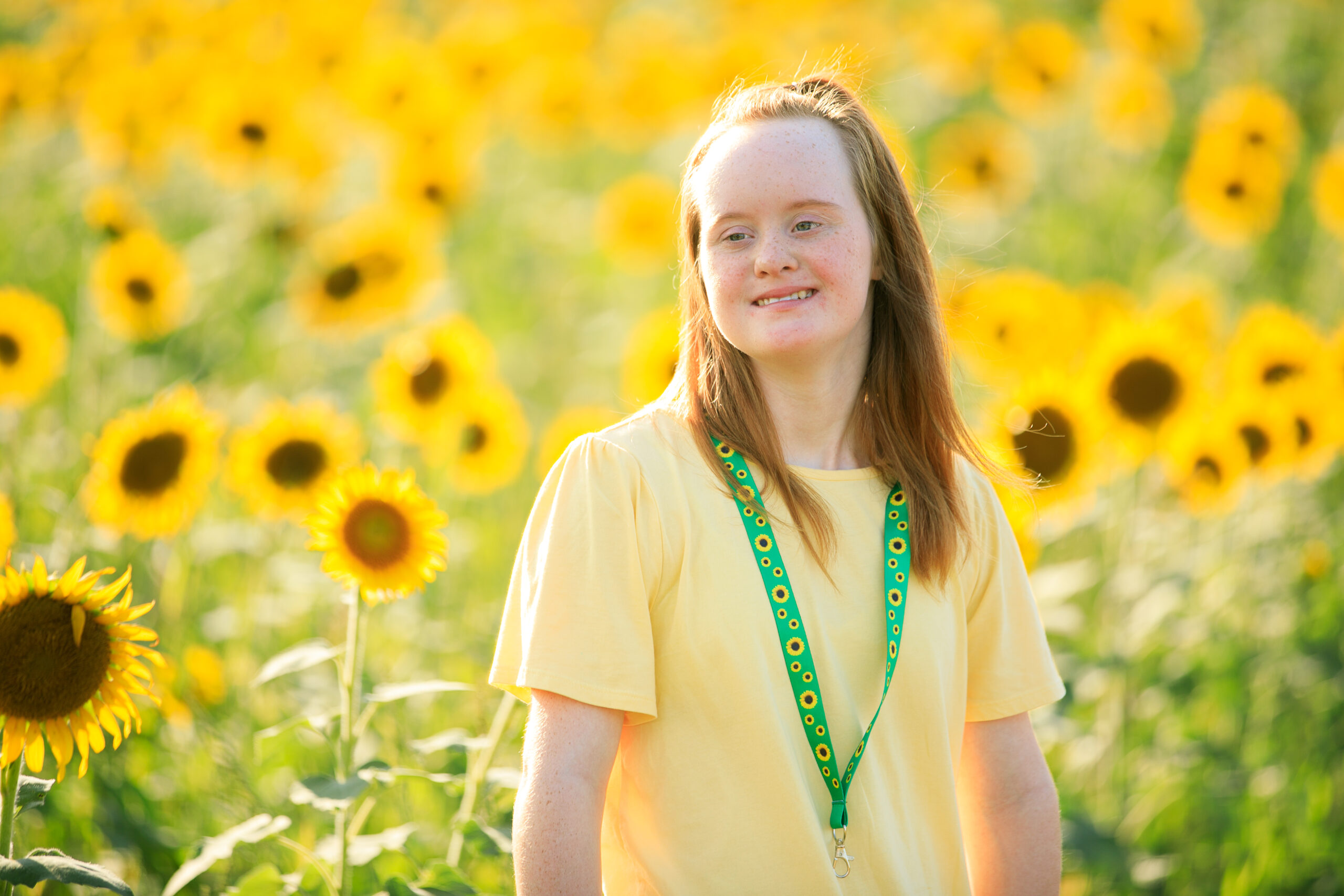
As an international symbol encouraging inclusivity, acceptance and understanding, the sunflower, worn as a lanyard, signals to others that a person might need a little extra time or assistance, say, navigating airport security. Participants in the Hidden Disabilities Sunflower Program opt in and can include people with any sort of cognitive, physical or age-related disability, such as dementia. “It’s a way of signaling to others that you might be half a step behind – or, for someone who is autistic, for example, that your response might be a little different than what others might expect – so please be patient,” says May. The program initially rolled out in partnership with Explore Charleston at the Charleston International Airport “because that’s the gateway to the region,” says May. The Children’s Museum of the Lowcountry has also signed on.
“If you are neurodiverse and no one knows it, research shows that can lead to social isolation,” says May. “I believe if we better recognized and understood neurodiverse individuals, there would be a lot more graciousness in this world.”
Her ongoing work to make that so was never something she anticipated when pursing her career in cognitive psychology; rather, one identified need, one opportunity to help others, has led to another, germinating and cross-pollinating like sunflowers in a field. Unexpected silver linings have indeed unfolded, May adds, “all through Grace.”



